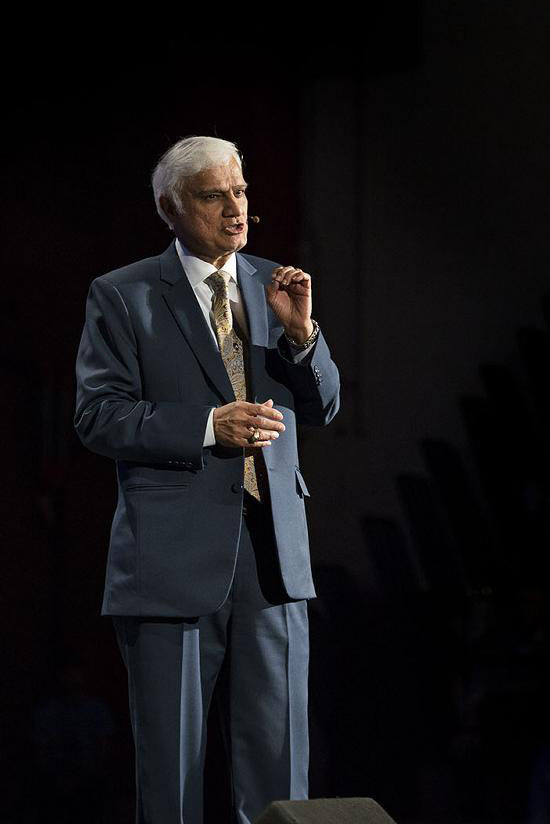
One of the most influential voices in Christian apologetics echoed through Chase Gymnasium on Feb. 22, 2014 as Ravi Zacharias joined radio host Dennis Prager to discuss the role of Christian influence in culture. The event — “Does God Matter? Finding Your Moral Footing in the Quicksand of Secularism” — was hosted by Torrey Honors Institute, Open Biola and Biola University Christian Apologetics.
Zacharias has spent over 40 years traveling around the world and addressing audiences ranging from church congregations to dignitaries. He sat down to discuss his ministry and his hopes for a new generation of Christian influencers.
You’ve been traveling and speaking for over 40 years, so you’ve spoken across generations and to many university campuses. What compels you to keep speaking?
It started off, of course, with a deep conviction of the truth, of the transforming power of the gospel, the redemption that the gospel brings and the answers Jesus gives to the human condition. My basic human apologetic tells me that in the four questions of life — origin, meaning, morality and destiny — the Christian worldview brings the most correspondingly true answers and coherent worldview of all.
At a time like this, your question is a very good one. What keeps you going? Before you came here, I was sharing that frankly, I’d like to — to use an analogy — hang up my skates. I’d like to pull back now to write and spend more time with the family.
But I don’t recall, in my 40 years of doing this, when conditions have been more treacherous — socially, politically, fiscally, spiritually.
And the invitations are mounting. I spend over 200 days a year on the road and generally [visit] 10 to 15 countries per year. We turn down 90 percent of invitations that come our way.
So circumstances, opportunity, conviction and need come together to keep me going.
Why did you decide to come to Biola?
We go into four arenas — academic, business, political and the arts — in addition to churches and conferences. Dennis Prager and I have done this before. I think he’s a much needed voice [in the arena].
You cannot accomplish anything unless there is a moral soil within culture. And what we’re looking for is to create a moral soil in our culture. Because out of that moral soil, good reasoning, good art, good dialogue [and] civility can come. If you don’t have a moral soil, everything becomes perverse and moves away from the center.
When Biola opened up its doors [to the event], I was delighted. I’ve been wanting to come here for a long time. I know your faculty, especially that in your philosophy department. So I’m delighted at the setting, the venue, the theme and this partnership with Dennis.
How has your ministry developed to speak to each new generation specifically as time has gone on?
Here’s the way I look at it: Philosophy comes at three levels. Level one is theory — argument, logic, reasoning. Level two is drama — literature and the arts. The arts is also philosophy, except it approaches through the back door of the imagination rather than the front door of reason. The third [level] is the kitchen table conversation, where you’re applying everything to life.
If you bring good argumentation and don’t forget the illustration through the arts and literature — which is what the younger generation is raised on — and then apply it to the kitchen table, then you’ve got the intellectual appeal, imaginative appeal and practical appeal [to all]. The vast majority of our audience are the young everywhere we go. And when I say young, I’m not just talking about the 20 to 30-year-old age bracket. I’m talking about 14, 15 and 16-year-olds. I get letters from 12 year-olds.
I think it reveals that they are hungry, they really want to think and they really want answers. Our team is specializing in doing that. It keeps us going and it keeps us young.
The mission of your ministry is to reach and challenge those who shape the ideas of a culture with the credibility of the gospel of Jesus Christ. If you could offer a word of encouragement or call to action to Biola students in light of your mission, what would you say?
I would encourage the students not to feel overwhelmed, not to feel overly daunted by the challenge they face. I have always seen that in some of the most resistant areas, some of the greatest works actually take place.
Secondly, don’t attempt to win battles while losing the war. Don’t go for symptomatic issues. Go for ideas that shape your thinking — out of which the symptoms emerge. So often, we get distracted and sidelined. It’s like the second World War. The Germans were shooting at what they thought were paratroopers but were actually rubber dummies. They were shooting these rubber dummies and spending all their artillery while the real attack was taking place somewhere else. Let’s not shoot at rubber dummies. Let’s talk to real people on real issues.
Lastly, maximize your experience as a student. Don’t take it lightly. Audit courses which will benefit you and keep you informed. You have to be a polyglot in our times.







